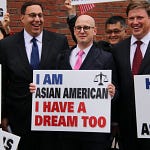Joseph Burgo is a psychoanalyst and author and a co-director of Genspect, an organization representing thousands of parents of children caught up in the ongoing transgender social contagion. The organizatioin now seeks to supplant the World Professional Association of Transgender Health as an authoritative source of guidance for how to deal with gender dysphoric youth.
Burgo gave a talk at the Genspect: the Bigger Picture conference in April, held concurrently and in the same city as the annual gathering of the European branch of WPATH, titled Autogynephilia, and the Sexualization of Shame which I published at this Substack last month.
We had a conversation presented here in podcast form, soon to be posted at the Year Zero YouTube channel, which I encourage everyone to follow, as I’ll be posting videos there more regularly.
As always, full transcripts of audio interviews are available to paid subscribers.
Some excerpts:
Wesley Yang
Let’s talk about the standard definition of what autogynephilia is. How did we come to know that this was a condition at all and what is it?
Joseph Burgo
It's very simple, it's men's sexual arousal at the idea or image of themselves as a woman. They are what we used to think as fetishistic cross-dressers — men who dress up in women's clothes and get off on it sexually. We know this from Ray Blanchard, who came up with the two types of transsexuals, the homosexual transsexual and the autogynephilic transsexual. Mike Bailey wrote about it, and Anne Lawrence did an exhaustive study on autogynephilia. What I find really frustrating is that these histories are really accounts of a fetish. I think of what Anne Lawrence wrote as the account of a fetish. It’s all about the fetish — the history of the fetish, when it appeared, how it affects their sex life and their relationships, with no sense that it means something. I mentioned in my paper that Anne Lawrence had collected all this data, and then deleted the lengthy family histories of these guys, as if it were peripheral to her study. I find it enormously frustrating. But I do think that's the way the mental health profession is these days. The idea that symptoms have meaning, that they might have an unconscious significance that can be sorted out; that it's a way of resolving internal conflict, or it represents some defensive compromise. People don't think that way anymore, I do feel kind of like a dinosaur these days.
Wesley Yang
In liberal enclaves like this, especially in ones that are surrounded by red hinterlands, they just accept the next new thing immediately. They don't question them. “Yeah, being born in the wrong body? That makes perfect sense to us.”
Were you already in tension and crisis with peers and with the school administration as a result?
Joseph Burgo
We didn't have much to do with the school administration. I was set back, and I didn't really know how to cope with this. I approached the people that I thought would help. I think I speak for parents all over America who are having exactly this experience: the mental health professionals will tell you that you need to affirm your child's identity, and you're a bigot. We consulted with the endocrinologist just to get an idea of what the reality was of these drugs. I said to her, just in passing, that it's kind of frustrating that I can't find anybody who's willing to look at the mental health aspects of this, what else might be going on. She looked at me with utter contempt, and said, “You’re not going to find that.” Like, “What an outlandish idea that there's a meaning to these symptoms.” It was really humiliating and awful.
Wesley Yang
Incredible. You're a credentialed medical professional within this field, a colleague, and you have standing within that community. The consensus had coalesced to the point where your reflexive belief that, “of course, no one is born in the wrong body,” had already made you a pariah.
Joseph Burgo
Totally. This has a chilling effect on the profession. A number of people at the conference talked about this, and I know lots of people who won't go anywhere near gender because it's just too fraught. Or they've jumped on the affirmative bandwagon and have built practices affirming children, which is unconscionable to me, but they do it.
Wesley Yang
There are many states that have bans, I guess North Carolina doesn’t, on what they call conversion therapy. Meaning if you help a child be comfortable in their own body, you are converting them from this fleeting psychological sense that they might be a member of the opposite sex, which we're going to reify and entrench as if it's their true identity and any deviation from it is a crime.
Joseph Burgo
Which is an absolutely insane position. It’s actually the opposite of what's true. One of the things I'm very upset about is that a lot of these gender nonconforming kids who would grow up to be gay or lesbian are being converted to trans. That's the real conversion therapy. I used to sit on the board of directors and was an officer and friends with everybody at my LGBT center where I live. When I dove into this space, I gave them an article I'd written and I said, “Do you want me to step down?” These are my friends and they said, “Yes, please go away.” They’d all jumped on board with the trans thing. It's the LGBT Center but now everything is trans. This was my big question: what if they're gay and not trans. And I'm treated like, “Go away.”
Wesley Yang
You’re still able to practice. They didn't cancel and destroy you, or they didn’t try to, or they didn’t succeed at it.
Joseph Burgo
The fortunate thing is that I'm at a point in my career where I have enough money. I’m in private practice. They can't really cancel me. What are they going do to me?
Joseph Burgo
And it justifies any kind of violence on your behalf, coming from you. The book I want to write next is really an update of Lasch. He diagnosed America famously as suffering from a narcissistic disorder. I think what we've got now is a culture that suffers from borderline personality disorder. My most recent essay, Living In An As If World, looks at the way this kind of detachment from reality, this “as if” existence that we're living where you can just make it up as you go along, is leading to detachment from reality, but also, increasingly, borderline behavior where borderline rage, vicious assaults, attempts to destroy people, which is kind of what borderlines are like, is widespread. It dominates Twitter, for sure. Twitter is like nonstop borderline rage all the time. I do think there's a cultural pathology that's gotten much, much worse. Even though I say the tide has turned, I think, “Can we really pull out? Can we pull back when the society is this ill?” I don't know.
Wesley Yang
What is borderline personality disorder and how do you see it manifesting in the culture?
Joseph Burgo
The personality disorders, particularly borderline personality disorder, are characterized by an unstable sense of self that vacillates back and forth between feeling like you’re superior and feeling like you're trash. It’s unstable emotional states, frequent outbursts of rage, when you are challenged or when you aren't validated. These people are prone to various kinds of addictions. They have a hard time forming realistic and lasting relationships. They tend to blow up their friendships and family relationships. These features sound, to me, a lot like the way trans rights activists behave. They really are the embodiment of a cluster B personality disorder, particularly borderline personality disorder. If you take it just on the way people respond to one another in space, the way people will be enraged about nothing and take other people down. They will feel slighted and go off in an explosive way. I think social media really is characterized by borderline kinds of communication.















Share this post